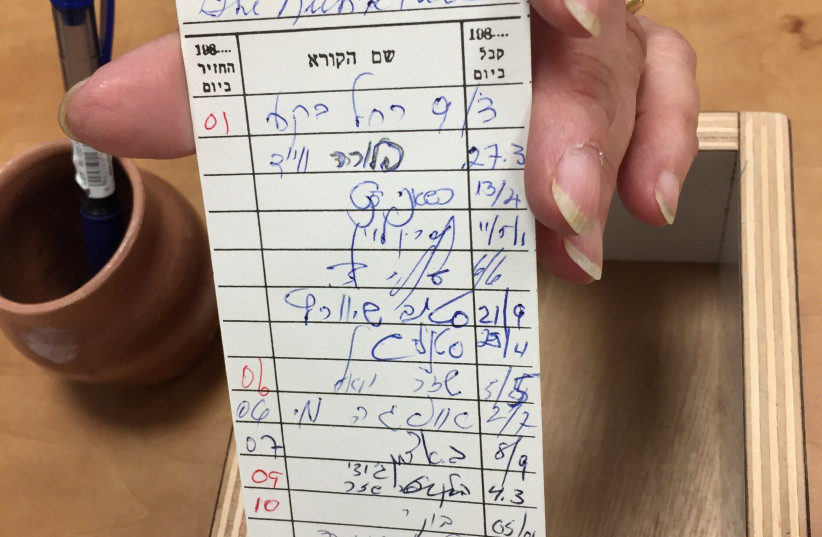The four volunteer librarians at the library in Gesher Haziv, Western Galilee, take printed books seriously, and yet they still have time for jokes.
The women, in their seventies, came to the kibbutz in the 1960s. Just recently, they all pitched in to work on a renovation of the library that took six months and cost over NIS 100,000 – despite statistics that show people are reading fewer and fewer books. Reopened this past April, the library has amassed the largest collection of English books for adults and children in the Mateh Asher Regional Council, and thousands of Hebrew volumes.
At a recent interview with the four women in the welcoming and well-organized library, this reporter felt like she was sitting in on a rehearsal for a TV sitcom.
“Jerry Seinfeld has nothing on us,” said Helen Frenkley, one of the women, as in walked another volunteer, Margie Lewis, who apologized for being late.
“This is my fifth excursion to the library!” Lewis said as she entered, with mock complaint.

“Who’s counting?” Frenkley said.
The kibbutz always had a lot of English-speakers arriving from the United States and Canada, the women explained. Each of them made aliyah through Ichud Habonim, a Zionist organization. Other members came from Beit Ha’arava, a kibbutz on the northern end of the Dead Sea that was evacuated during the War of Independence in 1948.
During the 1950s, kibbutz members did not have individual subscriptions to newspapers, so members went to the library to read copies of the paper. There was also a study room filled with encyclopedias where children and teenagers used to go to study.
“But that’s gone the way of Google,” one of the women said.
To attract people to the renovated library and reading room, Irit Ziv, former director of Yahel, the Senior Citizens Center for Learning and Seminars of Mateh Asher Regional Council, has been hired. She grew up on the kibbutz, where she often used the library, and still lives on the kibbutz. She plans to have lectures, story hours both in English and Hebrew, and other activities.
Before the renovation, the volunteers went through all the books in the library deciding which they would keep, leaving “only” some 10,000.
“We did a culling,” said Judy Grossman. “No, culling is for animals. I think we did a winnowing.”
“A thinning-out,” said Marcia Greenfeld, the fourth volunteer, explaining that they kept some books and gave away the rest (including all the encyclopedias).
And the four dedicated bookworms discovered, well, actual bookworms. They also stumbled upon history. Since the library is computerized but not bar-coded, library users write their name and the date they borrowed the book on its lending card, which the librarians register in the computer. (There’s even a can with spare reading glasses for older readers.) Some of the women discovered the names of their children on the bookmarks from years earlier. And since some of the books are donated, the women also discovered books that once belonged to friends.
“I declassified a sociology 101 textbook that belonged to Marcia’s husband, Si,” said Lewis.
When this reporter was stumped about what “declassified” meant, Frenkley explained that “‘deaccession’ is more correct than ‘declassify.’” In other words, nobody was borrowing the 40-year-old sociology textbook, so it was taken out of the library’s book inventory.
Frenkley said that doing the renovation, which included unpacking and reshelving all the books, showed “female dedication, strength – both physical and mental – and clarity of purpose.”
WHILE READERS of printed books have gone down, people continue to read. Greenfeld said that before Yom Kippur, for example, people borrow books to read during the holiday. At the start of summer vacation, students come in to take an English book to meet their summer reading requirement.
“They choose the book to read by weight,” Greenfeld said, half-joking.
Sometimes, however, children are so excited to read a book that they’ll even attempt to read it in English before the Hebrew translation. That happened with the first book in the Harry Potter series.
“It was the shortest one, too,” one of them said.
The women said they “grew up in libraries.” Each seems to have just finished one book and is about to start another. Their current favorites? Lewis, from Washington, DC, said she really liked Rachel Kadish’s Weight of Ink. Frenkley, from New York City, said she read a “remarkable book,” Little Aunt Crane, by Geling Yan, set in China during the years of the Cultural Revolution. Grossman, from Toronto, liked Tara Westover’s Educated, a memoir about growing up in a survivalist Mormon family. And Greenfeld, from Baltimore, liked Nickel Boys, by Colson Whithead.
Some of the librarians are not so fond of mysteries, “but everyone else is,” dismissing James Patterson as “low-brow,” and are drawn to “literature,” as they put it. They are thrilled that the Gesher Haziv Municipal Council voted to keep the library in its central spot on the kibbutz.
The library is on the path that once led to the kibbutz dining room, which was closed in 1998. There’s still the display window with books that people used to pass on the way to and from their meals.
“This is prime real estate,” said Greenfeld. “If you think of a town, this is equivalent to a spot on the town square.”
“Even if people don’t read,” said Lewis, “They still want the library to be here.” ■
The library is open to the public for browsing. Annual book-borrowing membership is NIS 120. Hours are Sunday, 11 a.m.-1 p.m.; Tuesday and Thursday, 5 p.m.-7 p.m. For further information: (04) 995-8412 during library hours.
